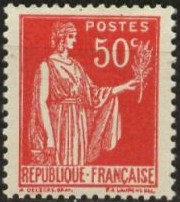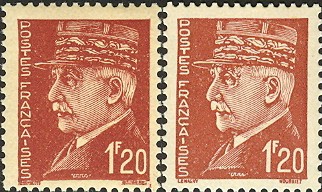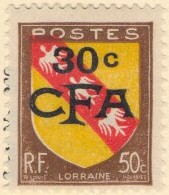 |
|||||
|
|||||
| Preview of Stamps Catalogue: VOLUME 1 |
 |
|||||
|
|||||
| Preview of Stamps Catalogue: VOLUME 1 |
Return To Catalogue - France overview - France 1917-1924
Note: on my website many of the
pictures can not be seen! They are of course present in the catalogue;
contact me if you want to purchase it.
90 c red 1.50 F blue
These stamps exist with error 'missing or displaced value inscription'. This error could occur since the value was printed separately from the rest of the stamp. I've also seen the 1.50 F imperforate.

90 c with '90 c' placed on top instead of the bottom.
I've seen a forgery of the 90 c with missing value inscription.
90 c red Surcharged '10 FR' on 90 c red (airmail stamp, RRR)
The airmail stamp '10 FR' (and a double bar on the old value) on 90 c was issued on the paquebot 'Ile-de-France'. The surcharge was applied in New York authorized by the French consul general on 3000 stamps. On some stamps the distance '10 FR' and the double bar is larger (6 1/2 mm instead of 4 1/2 mm).A hydroplane would leave the paquebot so the mail would arrive earlier in France. The same surcharged was also applied to a 1.50 Pasteur stamp. Many forged surcharges exist.
I've seen modern computer generated Hialeah forgeries of this stamp (imperforate), also of the 10 F on 90 c surcharged stamp (also imperforate).

1.50 F + 8.50 F blue
50 c blue
90 c red ('Le Puy en Velay', 1933)
2 F brown (Arc de Triomphe, 1931)
3 F grey (Cathedral of Reims, 1930)
5 F brown (Mont St.Michel)
10 F blue ('Port de la Rochelle', La Rochelle harbour)
10 F brown (La Rochelle harbour)
20 F brown (Pont du Gard)
50 c blue and red
1.50 F + 3.50 F lilac
15 c grey 40 c brown 50 c red 1.50 F blue 1.50 F blue (different design, larger size)

1.50 F + 3.50 F green
30 c green 40 c lilac 45 c olive 50 c red 55 c violet (1937) 60 c brown (1937) 65 c brown 65 c blue (1937) 75 c green 80 c orange (1938) 90 c red 90 c green (1938) 90 c blue (1938) 1 F orange 1 F lilac (1937) 1.25 F olive 1.25 F red (1939) 1.40 F lilac (1939) 1.50 F blue 1.75 F lilac Surcharged '50 =' (red) on 55 c violet (1941) '50 =' (red) on 65 c blue (1941) '50 =' (red) on 75 c green (1941) '50 =' (red) on 80 c orange (1941) '50 =' (red) on 90 c blue (1941) '50 c =' on 1.25 F olive (1934) '80 c =' (red) on 1 F orange '1 F =' on 1.25 F red (1941) '1 F =' (red) on 1.40 F lilac (1941) '1 F =' (red) on 1.50 F blue (1941)
These stamps exist with overprint 'F.M.' or 'F' (military frank stamps).


Postal forgeries of the 50 c 'Peace' issue; the 'c' after '50'
has a smaller loop. The general design is much more 'rough' than
the genuine stamp

Overprint 'Besetztes Gebiet Nordfrankreich',issued during World
War II. Certified genuine; see France
World War II locals etc. for more details.
30 c green (A.Briand) 75 c lilac (P.Doumer) 1.25 F brown (Victor Hugo)
1.50 F blue
40 c blue
75 c lilac 1.50 F blue
1.50 F blue
Specialists distinguish two shades of blue for this stamp.
75 c red 1.50 F blue
40 c red 1.50 F blue (different design)
1.50 F blue (aeroplane and ship) 10 F green (aeroplane and map)
Small size (man with horn) 20 c lilac 30 c green 40 c blue 50 c orange Larger size (man opening curtain revealing a globe) 90 c red 1.50 F blue

1.75 F blue 2 F red (1939) 2.25 F blue (1939) 2.50 F green (1939) 2.50 F blue (1940) 3 F red (1939) Surcharged '1 F' (red) on 1.75 F blue (1940) '1 F' (red) on 2.25 F blue (1941) '1 F' (red) on 2.50 F green (1941)


(1938 'Mercure' issue)
Inscription "REPUBLIQUE FRANCAISE" 1 c brown 2 c green 5 c red 10 c blue 15 c orange 15 c light brown 20 c lilac 25 c green 30 c red 40 c violet 45 c green 50 c blue 50 c green (1941) 60 c orange 70 c lilac 75 c brown Surcharged '50 =' (red) on 75 c brown (1941) Inscription "POSTES FRANCAISES" (1942) 10 c blue 30 c orange 40 c violet 50 c blue Overprinted "RF" (inscription "POSTES FRANCAISES", 1944) 10 c blue 30 c orange 40 c violet 50 c blue

Overprinted "Festung Lorient" issued for the town of
Lorient in Bretagne when it was cut off from the rest of France;
see France World War II locals etc.
for more details.


Left genuine stamp, right British war forgery. There are two
horizontal lines on the forehead in this forgery. There is a
white blotch on the cheek at the right hand side (from our
perspective). Also the top horizontal bar of the '5' ends too low
when compared to a genuine stamp.

War forgery of the 30 c (right) and a genuine stamp (left). As in
the above forged 25 c, there are two horizontal lines on the
forehead in this forgery. There is a white blotch on the cheek at
the right hand side (from our perspective). I've seen a sheetlet
of 16 stamps, with four blocks of 4 stamps with an empty space
between them. The forgeries are perforated 15 x 14.

Another war forgery (left) and genuine 'Iris' 1.50 F orange
(right); in the forgery, the torch has wavy lines below the flame
(slightly above halfway the flame and the top of the hand), while
a straight line can be found in the genuine stamps. The British
war forgery was printed in sheets of 20 (5 x 4)

Zoom-in of the torch of the forged stamp
80 c brown 80 c green 1 F green 1 F red 1 F blue 1.20 F violet 1.30 F blue 1.50 F orange 1.50 F light brown 2 F brown 2.40 F red 3 F orange 4 F blue
The Iris stamps appeared from 1939 to 1944.
Petain in circle 'POSTES' written on top 20 c lilac 30 c brown 40 c blue Petain with hat 50 c green 60 c violet 70 c blue 70 c orange 80 c brown 80 c green 1 F red 1.20 F brown 4 F blue (two types, '4' different) 4.50 F green (two types, '50' small or large) Petain in circle 1.50 F red 1.50 F brown 2 F green 2.40 F red 2.50 F blue 3 F orange Frontal view of Petain 5 F green 50 F black (larger size) Overprinted and surcharged '+ 50 S N' (red) on 1.50 F blue
I've seen a pneumatical mail card ("CARTE PNEUMATIQUE") with a 3 F orange design.


Petain 1941 1F50 issue; left genuine, right resistance forgery
Of the 1941 Petain issue postal forgeries of the 1F50 made by the resistance exist (the so-called 'Maquis' forgery or French underground forgery), the lines on the face are not as well done and the '5' has no white lines in it (the genuine has). Apparently 43200 sheets of these forgeries were made according to 'Postal Forgeries of the World' by H.G.L. Fletcher. Each sheet contains 96 stamps. The forgeries are perforated 11 1/2 (the genuine stamps 14 x 13 1/2). I've also seen an imperforate block of 4 stamps with a violet seal covering all four stamp on the back, the inscription reads: 'Atelier des faux DEFENCE DE LA FRANCE....'. It was apparently used to send forbidden journals from February to June 1944.
British intelligence forgeries of the values 30 c, 50 c, 70 c, 80 c, 1 F, 1F20, 1.50 F and 2 F also exist.

Genuine 30 c left, British war forgery at the right hand side.
In the intelligence forgery of the 30 c, the letters "ta" of "Vital" (bottom right corner) are separated, while they are printed together in the genuine stamps.

War forgery of the 50 c stamp, there should be an extra eyelid in
the right eye of Petain (difficult to distinguish) and there is a
dot behind the word "HOURRIEZ" in the right bottom
corner.

Genuine stamp left, war forgery of the 70 c right. The chin on
the war forgery is very white. Also the shading of the moustache
seems to be different (difficult to distinguish in this scan).

Genuine 1 F stamp at the left, war forgery at the right hand
side.
In the 1 F intelligence forgery, the word 'LeMagny' has the 'M' and 'Y' slightly shorter. Also the words "POSTES FRANCAISES" are much brighter when compared to a genuine stamp.

Genuine 1.20 F left, war forgery at the right hand side.
The 1.20 F intelligence forgery was printed badly and has the shading in the moustache below the nostril different. There is a minicule dot behind the word 'Hourriez' in the forgeries, which is missing in the genuine stamps.

British intelligence forgery of the 1.50 F
Besides the above mentioned resistance forgery of the 1.50 F, there also exists a much rarer British intelligence forgery (with a very 'staring eye') or war forgery of the 1.50 F. They were printed in sheets of 20 (5x4) and perforated 14 x 13 1/2. The 'F' is almost solid in colour and the bottom of this letter is horizontal (in the genuine stamps it is slanting down at the right).


Left genuine 2 F Petain issue, right British war forgery. The war
forgery has a 'staring eye', the '2 F' has no white lines in it.
For some of these forgeries, there is no dot behind 'PIEL'.

Another propaganda forgery, Petain with in the shadow the face of
Pierre Laval.

Another war forgery 1.50 F with the face of De Gaulle instead of
Petain in the center, made in 1942 by the French underground.
5 c lilac 10 c grey 25 c brown 50 c olive 1 F light blue 1.50 F red 2.50 F violet 4 F blue 5 F black 10 F orange With black value 30 c orange and black 40 c grey and black 50 c olive and black 60 c violet and black 80 c green and black 1.20 F brown and black 1.50 F red and black 2 F yellow and black 2.40 F red and black 3 F lilac and blue
These stamps were brought to France by the allied troups, when they landed in Normandy.
10 c blue 30 c light brown 40 c dark blue 50 c red 60 c blue 70 c brown 80 c green 1 F lilac 1.20 F olive 1.50 F red 2 F brown 2.40 F red 3 F green 4 F blue 4.50 F black 5 F orange 10 F green 15 F dark red 20 F red 50 F violet
Some non-issued stamps exist in a slightly different design (25 c green, 1 F red and 2.50 F blue): They have 'R' in the upper left corner and 'F' in the upper right corner. They are relatively rare, only 10,000 sets were prepared.
Gallic cock
10 c green
30 c lilac
40 c blue
50 c red
2 F blue
10 F violet
15 F brown
20 F black
Marianne facing the right ('Marianne d'Alger)
60 c brown 70 c lilac 80 c green 1 F violet 1.20 F red 1.50 F blue 2.40 F red 3 F green 4 F blue 4.50 F black 5 F blue
These stamps were first put on sale in Corsica (after the landing of the allied troups). In Paris, they were put on sale on 15th November 1944.
In this design exists: 60 c blue, 80 c green 90 c green (with Afrr. Postes), 1 F red, 1F20 brown, 1F30 blue, 1F50 lilac, 2F green and 2F50 brown. Also 1F on 1F30 blue. I've seen postal stationary: 1F50 lilac.

(1945 'Marianne of Gandon')
1.50 F red 2 F dark green 2.40 F orange 3 F brown 3 F lilac 3.50 F lilac 4 F blue 4 F violet 4 F green 4 F orange 4.50 F blue 5 F green 5 F red 5 F blue 5 F violet 6 F blue 6 F red 6 F green 8 F light blue 10 F orange 10 F blue 10 F lilac 12 F blue 12 F orange 15 F lilac 15 F blue 18 F red Slightly different type 4 F blue 10 F blue 15 F lilac 20 F green 25 F orange Larger size 20 F green 25 F violet 50 F brown 100 F red

Forgery of the 20 F stamp, made in Italy ('Faux d'Italie')
A postal forgery of the 15 F lilac stamp is described in 'Postal Forgeries of the World' by H.G.L.Fletcher.


